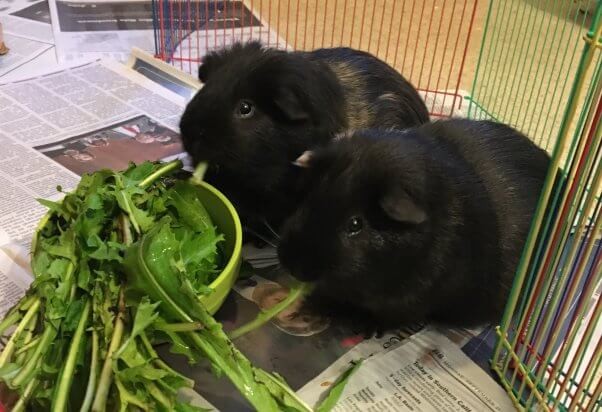Considering adding a furry friend to your family? Guinea pigs, with their adorable faces and gentle nature, are often touted as ideal pets, especially for children. But before you bring these small creatures home, it’s crucial to delve deeper and ask: Are Guinea Pigs Good Pets for you?
While undeniably charming, guinea pigs have specific needs that require commitment, time, and resources. Understanding these requirements is essential to ensure both your happiness and the well-being of your potential pet. Let’s explore the realities of guinea pig ownership to help you make an informed decision.
Two adorable guinea pigs enjoying a healthy snack of dandelion greens, highlighting the importance of a proper diet for these pets.
The Reality of Guinea Pig Care: More Demanding Than You Might Think
Often perceived as low-maintenance starter pets, guinea pigs actually demand a significant level of care. The notion that small animals are inherently easy to look after and cheaper than cats or dogs is a common misconception that often leads to surprises and potentially neglected pets.
So, are guinea pigs easy to care for? The straightforward answer is no. Keeping guinea pigs healthy, happy, and clean demands considerable time, energy, and financial investment.
My own experience with adopted guinea pigs, Duke and Bogart, has been incredibly rewarding. Their distinct personalities bring immense joy to my life. Bogart, the more food-motivated of the two, has an internal clock for meal and treat times, announcing his expectations with loud “wheeks” and enthusiastic “popcorning” – joyful jumps in the air – when food arrives. The mere rustle of a plastic bag or the opening of the vegetable drawer in the refrigerator sends him into a frenzy of excited anticipation. Duke, in contrast, is more reserved, selective about his treats, and enjoys quiet moments, often peeking out from his cozy hideaways for head scratches and gentle interaction. They exhibit a full range of social behaviors, from playful squabbles to affectionate cuddles. They are undeniably charming, endlessly photogenic, and full of funny antics.
However, the less glamorous side of guinea pig ownership is their susceptibility to various health issues. I’ve spent more time researching guinea pig symptoms and making trips to the veterinarian than I ever anticipated with any pet.
Respiratory infections are a primary health concern for guinea pigs and sadly, a leading cause of mortality in these animals. These infections can stem from various bacteria, including Bordetella, Staphylococcus, and Streptococcus, which guinea pigs can naturally carry. These bacteria can become problematic under stress or when the guinea pig’s immune system is compromised, leading to illness. As prey animals, guinea pigs instinctively hide any signs of illness or weakness. This survival mechanism means that often, guardians are unaware of a problem until the guinea pig has developed a serious condition like pneumonia. Beyond respiratory issues, guinea pigs are also prone to inner ear infections, gastrointestinal problems, scurvy (vitamin C deficiency), tumors, abscesses, urinary tract issues, and bumblefoot (a painful foot condition).
This predisposition to health problems necessitates vigilant monitoring from their owners. Regular health checks, including weight monitoring and close observation for any subtle changes in behavior or physical condition, are crucial. Guinea pig guardians must be prepared to seek veterinary attention immediately at the first sign of trouble. The level of attentive care required for these delicate animals is often beyond the capacity of young children.
Duke and Bogart, the author’s guinea pigs, showcasing their bond and the importance of companionship for guinea pig well-being.
Building Trust Takes Time and Patience
My colleague Elizabeth, another guinea pig enthusiast with two adopted cavies, aptly described a key challenge: “One thing I found difficult is that you have to convince your pigs to like you.” Guinea pigs, as prey animals, are naturally cautious. A human hand reaching into their space can be perceived as a threat, triggering their instinctual fear of predators approaching from above.
Guinea pigs require a gradual “approval process” to build trust. Young children, often lacking the necessary patience, may struggle to earn a guinea pig’s trust at a pace that is comfortable for the animal. Some guinea pigs, regardless of handling, may never fully enjoy being picked up or held, preferring a more “hands-off” relationship with their guardians. This preference largely depends on individual guinea pig personalities.
The Messy Truth About Guinea Pigs
Having previously cared for a large dog, I naively assumed that cleaning up after a small, two-pound animal would be a breeze. I was quickly proven wrong. Guinea pigs have continuously growing teeth, requiring them to chew constantly to keep their teeth at a healthy length. This constant chewing, combined with their diet of pellets, hay, fresh vegetables, and chew toys, results in a surprisingly large amount of waste.
Unfortunately, guinea pigs are not easily litter-trained, and their droppings end up scattered throughout their enclosure. Ideally, spot-cleaning the habitat multiple times a day is recommended. However, for those who are away from home during the day, a thorough cleaning is essential at least once daily, typically in the evening. I’ve found a practical solution is using fleece cage liners covered with towels. The towel layer is changed daily, and the entire bedding setup is replaced every couple of days.
A guinea pig enclosure demonstrating fleece bedding and enrichment items, illustrating the setup required for their comfort and hygiene.
Laundry Loads Are Part of the Guinea Pig Package
As you diligently change towels and bedding to maintain a clean environment for your guinea pigs, you’ll quickly realize that guinea pig laundry accumulates rapidly. In addition to bedding, cloth toys, ramp covers, and cuddle sacks also require regular washing. Be prepared to dedicate approximately two large loads of laundry per week solely to guinea pig items. Furthermore, you’ll need to clean fur and hay debris from your washing machine and dryer afterward. Elizabeth recommends using guinea pig laundry bags to help contain the mess and keep washing machines cleaner.
For convenient and frequent bedding changes, PETA Business Friend GuineaDad offers a range of fleece bedding options.
Sharp Teeth: Handle with Care
When a guinea pig chatters its teeth, it’s a clear warning signal, unequivocally meaning “Stop doing that!” However, even without teeth chattering, most guinea pigs are not fond of being picked up. They will often dart away, burrow, or hide when approached. When handling guinea pigs, it’s essential to be cautious, as they can squirm unexpectedly and risk falling and injuring themselves.
Often, once gently scooped up and securely wrapped in a blanket to provide a sense of safety, guinea pigs will relax enough for a quick health check, petting session, grooming, or treat. However, if they are not in the mood for handling, they may nip with their small but sharp teeth, which can break the skin.
Regular Nail Trims Are a Must
Guinea pig nails grow quickly and require regular trimming. Unless you are confident and skilled at performing nail trims yourself, you’ll need to take your guinea pigs to a veterinarian or groomer approximately once a month for nail trims. This routine care can cost around $15 to $20 per trim, and potentially more in certain areas.
Guinea Pigs Thrive in Pairs
In their natural habitat, guinea pigs are social creatures living in close-knit colonies. They establish social hierarchies, communicate through vocalizations and body language, and depend on social interaction. These highly social animals suffer both mentally and physically when kept in isolation. They need a companion of their own species for communication, play, mutual grooming, and cuddling.
The importance of companionship is so significant that in Switzerland, it is legally mandated to keep guinea pigs in pairs. If you plan to adopt a male and female pair, it’s crucial to have the male neutered at least six weeks before they are introduced to cohabitate to prevent unwanted litters.
Albert and Steve, two guinea pigs, demonstrating the close bond and companionship that these social animals require.
Frequently Asked Questions About Guinea Pig Care
Every animal deserves a loving home, and at PETA, we advocate for responsible pet ownership and aim to address the homeless-animal crisis. Our goal is to provide information to help people make informed decisions about pet ownership, discouraging impulsive purchases that can lead to animals being surrendered to shelters when the reality of care becomes overwhelming.
For those who are seriously considering adopting guinea pigs and are prepared for the long-term commitment, here are answers to some common questions:
What Should Guinea Pigs Eat?
A guinea pig’s diet should primarily consist of high-quality grass hay, such as timothy or orchard hay, and timothy hay-based food pellets without added seeds or artificial colors. They also require a daily serving of fresh vegetables and herbs, with fruits offered only sparingly as occasional treats. For detailed guidance on guinea pig nutrition, consult PETA’s guide to guinea pig nutrition.
Two guinea pigs sharing a lettuce leaf, illustrating the importance of fresh vegetables in their diet.
What Kind of Bedding Do Guinea Pigs Need?
Guinea pig habitats should be lined with comfortable fleece cage liners, ideally covered with towels for easier cleaning. These liners and towels need frequent changing and laundering. Use unscented, cruelty-free detergent, as fragrances can irritate guinea pigs’ sensitive respiratory systems.
Provide guinea pigs with hideaways such as igloos or small boxes with entrances, along with a large pile of hay and other areas where they can engage in their natural burrowing and hiding behaviors. Many guinea pigs feel more secure if their habitat is partially covered with a light sheet or blanket. Avoid using cedar or pine shavings for bedding, as they are toxic to guinea pigs.
Are Guinea Pig Veterinarians Expensive?
Veterinary care for guinea pigs can be more expensive than for common pets like dogs and cats. Many general practice veterinarians have limited experience with exotic animals and may refer you to a specialized exotic animal veterinarian for routine checkups and in case of illness. Consulting an exotic animal specialist can significantly increase veterinary costs.
Do Guinea Pigs Need Chew Toys?
Yes, chew toys are essential for guinea pigs. Apple branches and specialized wood chew blocks, available at pet supply stores, are excellent for keeping guinea pigs entertained, mentally stimulated, and helping to maintain their dental health by preventing their teeth from overgrowing.
What Is the Ideal Cage Size for Guinea Pigs?
Guinea pig enclosures should be as spacious as possible, with a minimum size of 5 feet by 2 feet for two guinea pigs. Most commercially available cages sold in pet stores are often too small. Confining guinea pigs to undersized cages is comparable to forcing a human to live in a bathroom. Never use cages with wire flooring, as it can cause painful foot injuries. Flooring materials like wood, tile, or linoleum (slick surfaces) are also not ideal. Provide soft, flexible flooring, such as fleece, to mimic their natural environment and prevent foot problems.
Connecting two Guinea Habitats by MidWest Homes for Pets, as I have for my pigs, offers ample space. Guinea pigs should also have daily access to a safe, enclosed area outside their cage for exercise and exploration.
How Should I Provide Water for My Guinea Pigs?
Guinea pigs should have access to fresh water in both heavy ceramic bowls and water bottles with sipper tubes. Clean and refill the bowls daily. Offering both options ensures that if one water source becomes contaminated or unavailable, they still have access to clean drinking water, as guinea pigs can be particular about their water sources.
How Often Do Long-Haired Guinea Pigs Need Brushing?
Long-haired guinea pigs require gentle combing at least once a week to prevent painful matting of their fur.
A guinea pig relaxing with its owner during “movie night,” highlighting the potential for bonding and companionship.
If your family is prepared to provide a pair of guinea pigs with a permanent, loving home for their lifespan of seven years or more, adoption is the most ethical choice. Duke and Bogart, for example, were rescued by PETA after an eyewitness documented their suffering, along with many other animals, at a PetSmart store in Nashville, Tennessee. Despite their illness and injuries, the store management refused veterinary care, deeming them “disposable” due to their low monetary value. Their recovery journey has been extensive and costly. PETA investigations have consistently revealed similar callousness and neglect at pet store suppliers across the industry.
The Unseen Source: Pet Store Guinea Pigs and Cruelty
As PETA has repeatedly exposed, guinea pigs and other small animals sold in pet stores typically originate from squalid, mass-breeding facilities. For instance, at PetSmart and Petco supplier Sun Pet Ltd., a PETA eyewitness documented horrific conditions: workers mishandling and violently killing hundreds of animals. Hamsters were brutally killed by being bagged and slammed against tables, unwanted animals were gassed in unsanitary tanks, and poison was used to slowly and painfully eliminate any animals who escaped.
At Great Pets, a breeding facility in Ohio supplying guinea pigs and birds to Petland, a 2021 PETA investigation revealed employees cramming guinea pigs into small, filthy metal tubs that had not been cleaned for weeks and reeked of ammonia. Animals suffering from respiratory infections, paralysis, and other serious medical issues were denied adequate care and often left to die slowly and agonizingly. One guinea pig with a severe respiratory infection struggled to breathe for at least three weeks before finally succumbing. Another female guinea pig, likely suffering from a uterine infection or carrying a deceased pup, was left to languish for two weeks before her suffering ended.
Guinea pigs in overcrowded and unsanitary tubs at a breeding facility, highlighting the cruel realities of pet store sourcing.
If you are committed to providing two guinea pigs with a lifetime of compassionate care, consider adoption from reputable guinea pig rescue organizations and humane societies. The Guinea Pig Adoption Network, Cavy Spirit, and Petfinder are excellent resources to begin your search. Every guinea pig is an individual deserving of love and respect, and with a dedicated guardian, they can be wonderful, rewarding companions.


